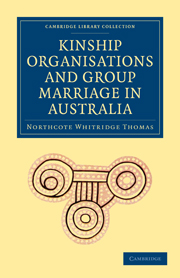Book contents
- Frontmatter
- PREFACE
- Contents
- BIBLIOGRAPHY
- INDEX TO ABBREVIATIONS
- CHAPTER I INTRODUCTORY
- CHAPTER II DESCENT
- CHAPTER III DEFINITIONS AND HISTORY
- CHAPTER IV TABLES OF CLASSES, PHRATRIES, ETC.
- CHAPTER V PHRATRY NAMES
- CHAPTER VI ORIGIN OF PHRATRIES
- CHAPTER VII CLASS NAMES
- CHAPTER VIII THEORIES OF THE ORIGIN OF CLASSES
- CHAPTER IX KINSHIP TERMS
- CHAPTER X TYPES OF SEXUAL UNIONS
- CHAPTER XI GROUP MARRIAGE AND MORGAN'S THEORIES
- CHAPTER XII GROUP MARRIAGE AND THE TERMS OF RELATIONSHIP
- CHAPTER XIII PIRRAURU
- CHAPTER XIV TEMPORARY UNIONS
- APPENDIX: ANOMALOUS MARRIAGES
- INDEX OF PHRATRY, BLOOD, AND CLASS NAMES
- INDEX OF SUBJECTS
- Plate section
CHAPTER XIV - TEMPORARY UNIONS
Published online by Cambridge University Press: 05 February 2012
- Frontmatter
- PREFACE
- Contents
- BIBLIOGRAPHY
- INDEX TO ABBREVIATIONS
- CHAPTER I INTRODUCTORY
- CHAPTER II DESCENT
- CHAPTER III DEFINITIONS AND HISTORY
- CHAPTER IV TABLES OF CLASSES, PHRATRIES, ETC.
- CHAPTER V PHRATRY NAMES
- CHAPTER VI ORIGIN OF PHRATRIES
- CHAPTER VII CLASS NAMES
- CHAPTER VIII THEORIES OF THE ORIGIN OF CLASSES
- CHAPTER IX KINSHIP TERMS
- CHAPTER X TYPES OF SEXUAL UNIONS
- CHAPTER XI GROUP MARRIAGE AND MORGAN'S THEORIES
- CHAPTER XII GROUP MARRIAGE AND THE TERMS OF RELATIONSHIP
- CHAPTER XIII PIRRAURU
- CHAPTER XIV TEMPORARY UNIONS
- APPENDIX: ANOMALOUS MARRIAGES
- INDEX OF PHRATRY, BLOOD, AND CLASS NAMES
- INDEX OF SUBJECTS
- Plate section
Summary
It has been mentioned above that the pirrauru custom, so far from being an extension of the recognised practice of Australian tribes, is in some respects a limitation of it. We may now proceed to illustrate this. Even among the Dieri the tribal festival on the occasion of an inter-tribal marriage is marked by free intercourse between the sexes without regard to existing sexual unions (? either tippa-malku or pirrauru). In the same way the Wiimbaio tribal gatherings were accompanied by regulated promiscuity, the class rules being the only limitation. At others wives could be lent or temporarily exchanged by the husbands. The Geawe-gal held festivals at which wives were lent to young men, subject to class laws. In other cases the exchange was limited to brothers or men of the same totem. Among the Kamilaroi a wife was lent to friendly visitors but only with her consent. In all these cases we see a state of things similar to or not unlike the relations of the Dieri pirrauru spouses, and it should be noted that it is at tribal gatherings that the latter can claim to exercise their rights. From this it appears that the Dieri custom amounts to an ear-marking of certain women for the use of certain men, and is consequently a limitation of the common custom; in consideration of the fact that the pirrauru men protect them in the absence of their husbands, they are permitted at the same time to exercise marital rights, provided their own primary spouses are absent.
- Type
- Chapter
- Information
- Kinship Organisations and Group Marriage in Australia , pp. 142 - 149Publisher: Cambridge University PressPrint publication year: 2010First published in: 1906



